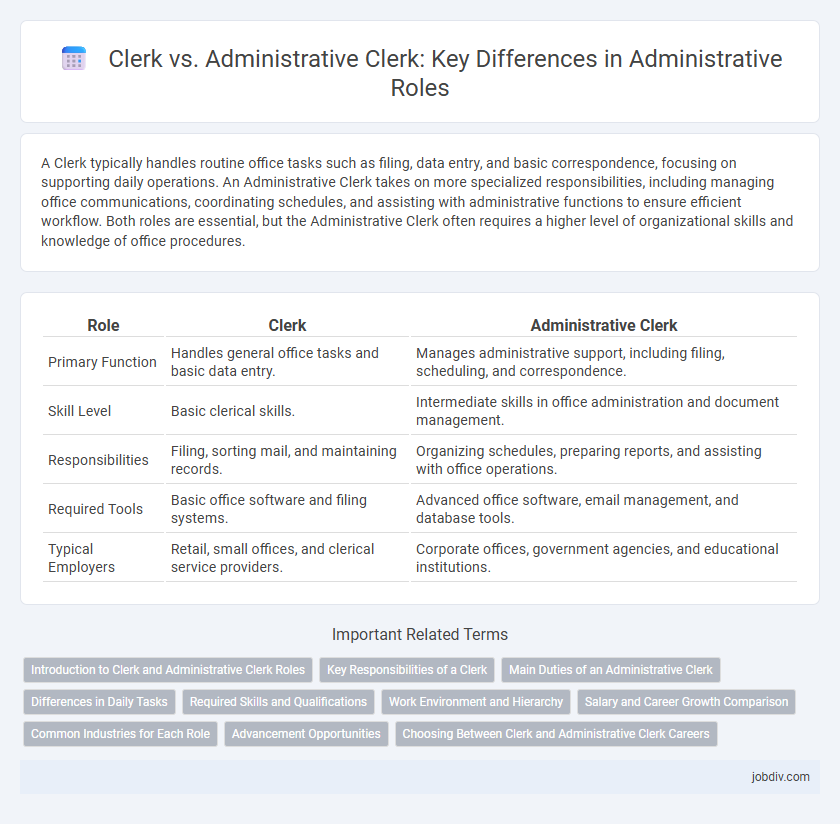A Clerk typically handles routine office tasks such as filing, data entry, and basic correspondence, focusing on supporting daily operations. An Administrative Clerk takes on more specialized responsibilities, including managing office communications, coordinating schedules, and assisting with administrative functions to ensure efficient workflow. Both roles are essential, but the Administrative Clerk often requires a higher level of organizational skills and knowledge of office procedures.
Table of Comparison
| Role | Clerk | Administrative Clerk |
|---|---|---|
| Primary Function | Handles general office tasks and basic data entry. | Manages administrative support, including filing, scheduling, and correspondence. |
| Skill Level | Basic clerical skills. | Intermediate skills in office administration and document management. |
| Responsibilities | Filing, sorting mail, and maintaining records. | Organizing schedules, preparing reports, and assisting with office operations. |
| Required Tools | Basic office software and filing systems. | Advanced office software, email management, and database tools. |
| Typical Employers | Retail, small offices, and clerical service providers. | Corporate offices, government agencies, and educational institutions. |
Introduction to Clerk and Administrative Clerk Roles
A Clerk is responsible for basic office tasks such as filing, data entry, and managing correspondence, ensuring smooth daily operations. An Administrative Clerk performs similar functions but often handles more complex duties including scheduling, record-keeping, and supporting higher-level administrative staff. Both roles require strong organizational skills, attention to detail, and proficiency in office software to maintain efficient administrative processes.
Key Responsibilities of a Clerk
A Clerk handles general office tasks such as filing, data entry, and managing correspondence to ensure smooth workflow. Administrative Clerks focus on supporting higher-level administrative functions, including scheduling appointments, maintaining records, and preparing reports. Both roles require organizational skills, attention to detail, and proficiency in office software to enhance operational efficiency.
Main Duties of an Administrative Clerk
Administrative Clerks manage essential office tasks such as organizing records, handling correspondence, and maintaining filing systems to ensure smooth workflow. They often support higher-level staff by scheduling appointments, preparing reports, and processing invoices with accuracy and confidentiality. Unlike general clerks, their main duties emphasize administrative support that requires familiarity with office procedures and communication protocols.
Differences in Daily Tasks
A Clerk primarily handles general office duties such as filing, data entry, and answering phones, while an Administrative Clerk often takes on more specialized responsibilities like scheduling appointments, preparing reports, and managing correspondence. Administrative Clerks typically support higher-level management by organizing office operations and maintaining detailed records. The key difference lies in the complexity and scope of daily tasks, with Administrative Clerks performing more advanced administrative functions compared to Clerks.
Required Skills and Qualifications
Clerks typically require basic organizational skills, proficiency in data entry, and familiarity with office software such as Microsoft Office or Google Workspace. Administrative clerks demand advanced skills including effective communication, multitasking abilities, and knowledge of administrative procedures, often paired with experience in scheduling, record-keeping, and customer service. Both roles commonly require a high school diploma or equivalent, though administrative clerks may need additional certifications or relevant work experience in office administration.
Work Environment and Hierarchy
Clerks typically work in various office environments, handling routine administrative tasks with limited supervision, often reporting to departmental managers or supervisors. Administrative Clerks operate in similar settings but may have more specialized responsibilities, such as managing records and coordinating schedules, usually positioned within a defined administrative support hierarchy. The hierarchical structure places Administrative Clerks slightly higher due to their involvement in more complex organizational processes compared to general clerks.
Salary and Career Growth Comparison
Administrative Clerks typically earn higher salaries than general Clerks due to specialized tasks and increased responsibilities, with median wages ranging from $35,000 to $45,000 annually compared to $28,000 to $38,000 for Clerks. Career growth for Administrative Clerks often includes advancement into supervisory or managerial roles within office administration, whereas Clerks usually face more limited progression opportunities confined to entry-level or support positions. Job market trends indicate that Administrative Clerks benefit from stronger growth prospects linked to expanding organizational needs for skilled administrative professionals.
Common Industries for Each Role
Clerks commonly work in retail, banking, and healthcare industries, handling general record-keeping and customer service tasks. Administrative clerks are frequently employed in government agencies, educational institutions, and corporate offices where they manage office operations, data entry, and scheduling. Both roles require organizational skills, but administrative clerks often support complex administrative functions within professional environments.
Advancement Opportunities
Administrative clerks typically have greater advancement opportunities compared to general clerks due to their specialized skills in office management, data handling, and communication. They can progress to roles such as office supervisors, executive assistants, or administrative coordinators, benefiting from additional training and certifications. In contrast, general clerks often face limited upward mobility, usually advancing only to senior clerk or specialized support positions.
Choosing Between Clerk and Administrative Clerk Careers
Choosing between Clerk and Administrative Clerk careers depends on the scope of duties and organizational needs; Clerks often handle routine office tasks such as filing and data entry, while Administrative Clerks manage more specialized functions including scheduling, correspondence, and supporting higher-level administrative operations. Evaluating job descriptions and required skills, such as proficiency in office software and communication abilities, helps determine the best career path. Consideration of industry-specific demands and opportunities for career advancement should guide the decision to ensure alignment with long-term professional goals.
Clerk vs Administrative Clerk Infographic

 jobdiv.com
jobdiv.com